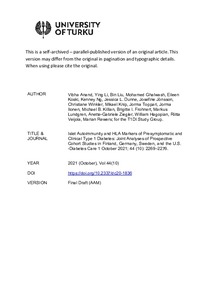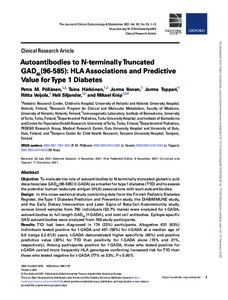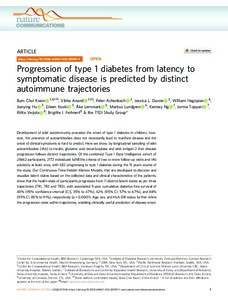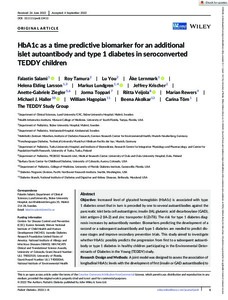Hae
Aineistot 1-10 / 12
Torque Teno Virus Primary Infection Kinetics in Early Childhood
Human torque teno viruses (TTVs) are a diverse group of small nonenveloped viruses with circular, single-stranded DNA genomes. These elusive anelloviruses are harbored in the blood stream of most humans and have thus been ...
INnoVative trial design for testing the Efficacy, Safety and Tolerability of 6-month treatment with incretin-based therapy to prevent type 1 DIAbetes in autoantibody positive participants: A protocol for three parallel double-blind, randomised controlled trials (INVESTDIA)
<p><strong>Aims</strong> beta-cell stress and dysfunction may contribute to islet autoimmunity and progression to clinical type 1 diabetes. We present a protocol of three randomised controlled trials assessing the effects ...
Islet Autoimmunity and HLA Markers of Presymptomatic and Clinical Type 1 Diabetes: Joint Analyses of Prospective Cohort Studies in Finland, Germany, Sweden, and the US
<div><p>OBJECTIVE</p><p>To combine prospective cohort studies, by including HLA harmonization, and estimate risk of islet autoimmunity and progression to clinical diabetes.<br></p><p>RESEARCH DESIGN AND METHODS<br></p><p>For ...
Imputing Longitudinal Growth Data in International Pediatric Studies: Does CDC Reference Suffice?
This study investigates a missing value imputation approach for longitudinal growth data in pediatric studies from multiple countries. We analyzed a combined cohort from five natural history studies of type 1 diabetes (T1D) ...
Umbilical cord blood DNA methylation in children who later develop type 1 diabetes
<p><strong>Aims/hypothesis:</strong> Distinct DNA methylation patterns have recently been observed to precede type 1 diabetes in whole blood collected from young children. Our aim was to determine whether perinatal DNA ...
Autoantibodies to N-Terminally Truncated GAD65(96-585): HLA Associations and Predictive Value for Type 1 Diabetes
<p><strong>Objective</strong> <br></p><p>To evaluate the role of autoantibodies to N-terminally truncated glutamic acid decarboxylase GAD<sub>65</sub>(96-585) (t-GADA) as a marker for type 1 diabetes (T1D) and to assess the potential HLA-associations with such autoantibodies.<br></p><p><strong>Design</strong><br></p><p>In this cross-sectional study combining data from the Finnish Pediatric Diabetes Register, the Type 1 Diabetes Prediction and Prevention (DIPP) Study, the DIABIMMUNE Study, and the Early Dietary Intervention and Later Signs of Beta-Cell Autoimmunity (EDIA) Study, venous blood samples from 760 individuals (53.7% males) were analyzed for t-GADA, autoantibodies to full-length GAD<sub>65</sub> (f-GADA), and islet cell antibodies. Epitope-specific GAD autoantibodies were analyzed from 189 study participants.<br></p><p><strong>Results</strong><br></p><p>T1D had been diagnosed in 174 (23%) participants. Altogether 631 (83%) individuals tested positive for f-GADA and 451 (59%) for t-GADA at a median age of 9.0 years (range 0.2-61.5). t-GADA demonstrated higher specificity (46%) and positive predictive value (30%) for T1D than positivity for f-GADA alone (15% and 21%, respectively). Among participants positive for f-GADA, those who tested positive for t-GADA carried more frequently HLA genotypes conferring increased risk for T1D than those who tested negative for t-GADA (77 vs. 53%; P<0.001).<br></p><p><strong>Conclusions</strong><br></p><p>Autoantibodies to N-terminally truncated GAD improve the screening for T1D compared to f-GADA and may facilitate the selection of participants for clinical trials. HLA class II-mediated antigen presentation of GAD(96-585)-derived or structurally similar peptides might comprise an important pathomechanism in T1D.</p>...
Non-HLA Gene Polymorphisms in the Pathogenesis of Type 1 Diabetes: Phase and Endotype Specific Effects
The non-HLA loci conferring susceptibility to type 1 diabetes determine approximately half of the genetic disease risk, and several of them have been shown to affect immune-cell or pancreatic beta-cell functions. A number ...
Progression of type 1 diabetes from latency to symptomatic disease is predicted by distinct autoimmune trajectories
Development of islet autoimmunity precedes the onset of type 1 diabetes in children, however, the presence of autoantibodies does not necessarily lead to manifest disease and the onset of clinical symptoms is hard to ...
HbA1c as a time predictive biomarker for an additional islet autoantibody and type 1 diabetes in seroconverted TEDDY children
<p><b>Objective </b><br>Increased level of glycated hemoglobin (HbA1c) is associated with type 1 diabetes onset that in turn is preceded by one to several autoantibodies against the pancreatic islet beta cell autoantigens; ...









